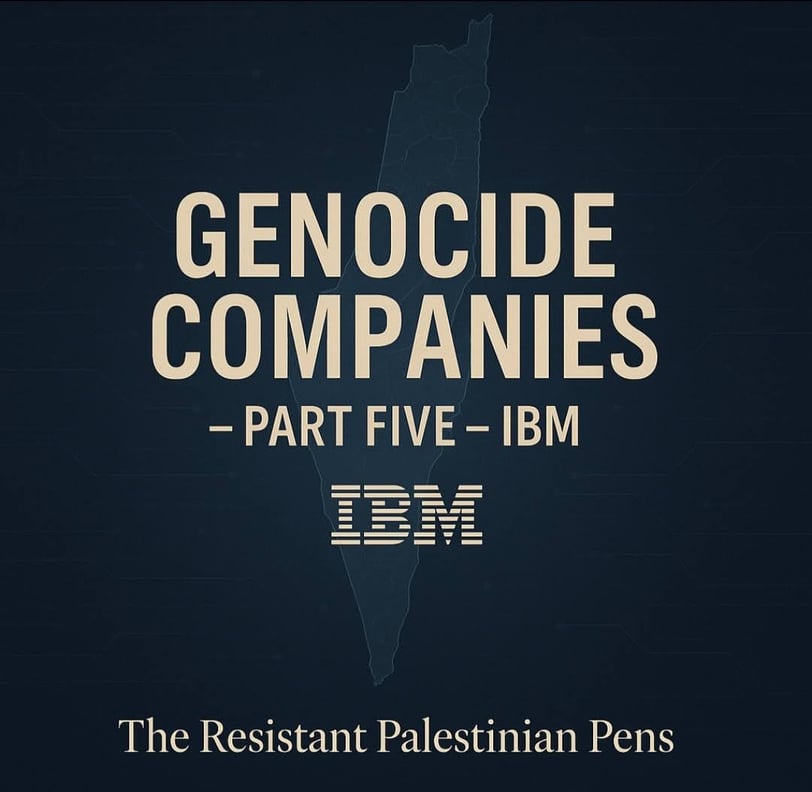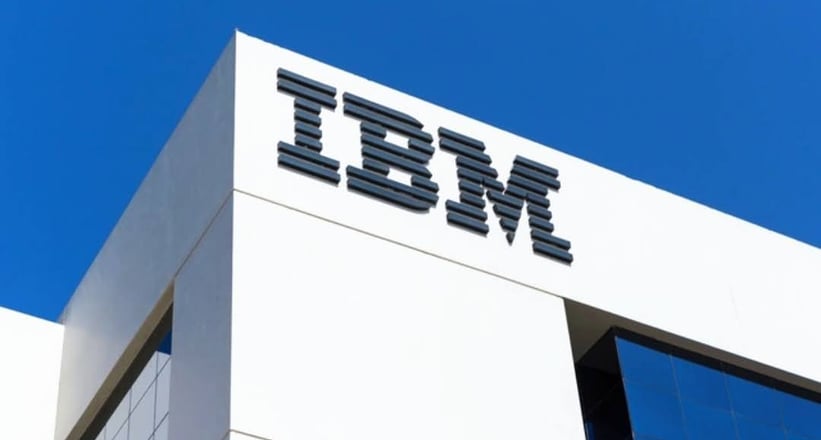Genocide Companies - Part Five - IBM
Discover IBM’s extensive history in Israel since 1972, from pioneering R&D at the Haifa Research Lab to strategic acquisitions and advanced technological contributions in cloud computing, AI, and surveillance systems. Learn about IBM’s collaborations with Israeli military and intelligence, including Unit 8200 and the PIBA database, and the ethical concerns surrounding its role in the region’s defense and surveillance infrastructure.
REPORT
7/11/202511 min read


IBM’s History in Israel and Research & Development Efforts
IBM’s research and development (R&D) journey in Israel began in 1972 when Professor Josef Raviv established the IBM Israel Scientific Center in the Computer Science Building at the Technion in Haifa. This marked the beginning of IBM’s enduring and significant presence in the country.
Since then, the Haifa Research Lab (HRL) has grown substantially, from three researchers to over 500 employees, including permanent staff and numerous students, making it IBM’s largest research center outside the United States.
This growth reflects a strategic, long-term investment in Israel’s technological capabilities. By 2023, over 3,000 individuals work at IBM’s R&D facilities across Israel, including in Haifa, Tel Aviv, Herzliya, Rehovot, and Jerusalem’s Technology City, showcasing a robust and integrated operation.
Operational Scope, R&D Centers, and Key Acquisitions
IBM Israel’s R&D efforts span a wide range of advanced technological fields, including cloud computing, healthcare and life sciences, verification technologies, multimedia, event processing, information retrieval, programming environments, business transformation, and optimization technologies.
Specialized labs contribute to key areas:
Systems and Technology Group Lab (STG): Focuses on developing advanced technologies for IBM’s Systems and Technology Group, including storage technology, data deduplication software, and chip design. Its divisions include hardware development, storage systems development, and Diligent Technologies.
IBM Israel Software Lab (ILSL): Located in Jerusalem’s Technology City, it develops software for real-time collaboration, content discovery, text analytics, metadata management, application security, and service-oriented architecture (SOA).
IBM has strategically acquired several Israeli companies, integrating their innovative products and functions into its global portfolio. Notable acquisitions include
Ubique
Description: Developer of instant messaging and collaboration products integrated into IBM Lotus Sametime.
Acquisition Date: May 19, 1998.
Value (USD): Not disclosed.
iPhrase Systems
Description: A U.S. company with a 30-employee R&D center in Jerusalem. IBM acquired its Israel operations when it merged with Banter Systems, a startup developing automated text classification software.
Acquisition Date: November 1, 2005.
Value (USD): Not disclosed.
Unicorn Solutions
Description: Developer of metadata management software, providing metadata repositories, ontology modeling, semantic mapping, active design services, and unified business query services.
Acquisition Date: May 5, 2006.
Value (USD): $10 million.
WatchFire
Description: Its flagship product, AppScan, developed by Israel-based Sanctum (acquired by WatchFire in 2004), is a solution for application security integration, now rebranded as IBM Rational AppScan.
Acquisition Date: July 20, 2007.
Value (USD): Not disclosed.
XIV
Description: High-performance disk storage products, now rebranded as the IBM XIV Storage System.
Acquisition Date: January 2, 2008.
Value (USD): Not disclosed.
FileX
Description: Disk-based backup and recovery solutions.
Acquisition Date: April 10, 2008.
Value (USD): Not disclosed.
Diligent Technologies
Description: Data deduplication solutions.
Acquisition Date: April 18, 2008.
Value (USD): $200 million.
Guardium
Description: Provider of real-time database security and monitoring solutions to protect enterprise data and meet regulatory compliance requirements.
Acquisition Date: November 30, 2009.
Value (USD): $225 million.
Storwize
Description: Provider of data compression solutions, now known as IBM Storwize.
Acquisition Date: July 29, 2010.
Value (USD): $140 million.
Trusteer
Description: Endpoint cybercrime prevention.
Acquisition Date: September 3, 2013.
Value (USD): $630 million.
EZSource
Description: Application discovery and dashboard visualization.
Acquisition Date: June 1, 2016.
Value (USD): Not disclosed.
IBM’s Strategic Partnerships with the Israeli Military and Intelligence
IBM demonstrates both direct and indirect collaboration with Israel’s defense and intelligence sectors, providing specific technologies and services.
Collaboration with Defense and Intelligence Units (e.g., Unit 8200)
IBM provides training to Israeli military and intelligence agencies, with specific references to its involvement with Unit 8200. This elite Israeli intelligence unit is responsible for a wide range of covert operations, including signals intelligence, code decryption, counterintelligence, cyber warfare, military intelligence, and surveillance. IBM’s contributions to training this unit directly enhance Israel’s advanced intelligence capabilities.
Providing training to personnel within such a critical intelligence unit involves the direct transfer of expertise and knowledge. This is not merely a commercial transaction but a contribution to the human capital and operational efficiency of a military intelligence apparatus.
IBM’s direct involvement actively strengthens Israel’s capabilities in pivotal areas of its military and security operations, including those criticized for their impact on civilian populations (e.g., surveillance). This establishes a clear causal link between IBM’s activities and the enhancement of Israel’s intelligence capabilities, raising questions about the company’s responsibility for the subsequent application of these enhanced skills.


Provision of Advanced Surveillance and Data Management Systems (e.g., Population and Immigration Authority Database)
Since 2019, IBM Israel has been responsible for operating and updating the central database of the Population and Immigration Authority (PIBA). This system, known as “Eitan,” designed and operated by IBM, facilitates the collection, storage, and use of biometric data of Palestinians by the government.
It supports Israel’s “discriminatory permit system” and enables “population monitoring and control” through biometric identification and data management. More broadly, IBM’s technology is noted for enhancing “prison services and surveillance,” including CCTV networks, biometric surveillance, advanced technological checkpoint networks, “smart walls,” and drone surveillance.
IBM’s direct operational role in a government system widely criticized by human rights organizations for its discriminatory nature and function in controlling Palestinian movement and lives removes any ambiguity about the system’s purpose.
Unlike dual-use technologies where ethical concerns arise from potential misuse, IBM is directly involved in operating a system inherently linked to alleged human rights violations and discriminatory practices. This significantly elevates the company’s level of responsibility and potential complicity, drawing parallels with historical accusations against IBM regarding its role in apartheid systems.
Role of Artificial Intelligence (AI) in Military Applications
The Israeli military has developed and deployed advanced AI systems such as “Lavender,” “Gospel,” and “Where’s Daddy?” for data processing and target generation. These systems are described as “reshaping modern warfare.” They are used for “automated battlefield decision-making” and “predictive policing technology,” indicating a high level of technological sophistication in military operations.
IBM, alongside other major tech firms like Microsoft, Alphabet (Google), and Amazon, provides Israel with “quasi-governmental access to its cloud and AI technologies.” This significantly enhances Israel’s data processing and surveillance capabilities. According to a former Israeli intelligence official, the AI system “Gospel” facilitates a “mass assassination factory” where “the focus is on quantity, not quality” of targets, raising serious ethical concerns about AI-driven targeting.
Overview of IBM’s Technological Contributions to the Israeli Military and Intelligence
- Training
Units/Agencies Involved: Israeli military, intelligence agencies (e.g., Unit 8200).
Key Technologies/Systems: Specialized training programs.
Impact/Function: Enhances signals intelligence, cyber warfare, decryption, counterintelligence, military intelligence, and surveillance.
- Database Management
Units/Agencies Involved: Population and Immigration Authority (PIBA).
Key Technologies/Systems: Eitan system (PIBA database), biometric data.
Impact/Function: Population monitoring and control, support for the discriminatory permit system.
- Cloud Infrastructure and AI
Units/Agencies Involved: Israeli military, Ministry of Defense, government agencies.
Key Technologies/Systems: Cloud platforms, AI technologies (enabling systems like Lavender and Gospel).
Impact/Function: Enhances data processing and surveillance capabilities, automated battlefield decision-making, predictive policing, and target generation.
- Surveillance Technologies
Units/Agencies Involved: Israeli military, security agencies.
Key Technologies/Systems: CCTV networks, biometric surveillance, checkpoint networks, smart walls, and drone surveillance.
Impact/Function: Enhances prison services and surveillance.
Economic Contributions and Support for Israeli Government Infrastructure
IBM broadly impacts the Israeli economy and provides critical technologies to government agencies, indirectly supporting the state’s overall capabilities, including its defense budget.
A strong national economy provides the financial and human resources necessary for the state to fund its public services and various governmental functions, including defense and security. Thus, IBM’s general economic contributions, while not direct payments to the military, indirectly but significantly bolster Israel’s overall financial and technological health, which can then be allocated to military spending and other strategic priorities. This represents a systemic form of support often overlooked when focusing solely on direct military contracts.
Indirect Economic and Operational Support for Defense Capabilities
A UN report highlights a “65 percent increase in Israeli military spending from 2023 to 2024,” reaching $46.5 billion, one of the highest per capita rates globally. This surge led to “a sharp rise in annual profits” for involved companies. The report explicitly notes that “foreign arms companies, particularly producers of munitions and equipment,” benefit, citing tech giants, including IBM, as beneficiaries.
The Tel Aviv Stock Exchange index rose “an unprecedented 179 percent” since October 2023, adding $157.9 billion in market value, with profits soaring for entities in the arms, technology, and infrastructure sectors. IBM was specifically mentioned in a statement by the Palestinian National Boycott Committee (BNC) for “providing cloud infrastructure and AI technologies to the Israeli Ministry of Defense,” indicating a direct operational link to the defense sector.
UN reports suggest that companies like IBM, which “previously enabled and profited from the dispossession and erasure of Palestinians within the occupation economy,” are now “implicated in the genocide economy” since Israel launched its war on Gaza in October 2023.
There is a clear economic incentive and direct financial benefit for companies providing technology and services to Israel’s defense sector, particularly during periods of heightened military activity and inflated budgets. This indicates a direct causal link between the conflict, increased military spending, and corporate profitability.
The UN report’s assertion that companies are now “implicated in the genocide economy” suggests that these economic activities are not merely neutral business operations but actively contribute to and profit from actions alleged to constitute international crimes. This raises profound ethical questions about the responsibility of corporations whose business models are intertwined with and profit from ongoing conflicts and human rights crises.


IBM’s Response and Activities Post-October 7, 2023
This section addresses IBM’s initial statements and actions following the events of October 7, 2023, comparing them with subsequent reports on its continued and expanded involvement in Israeli military and surveillance systems during the Gaza conflict.
Initial Company Statements and Humanitarian Initiatives
On October 16, 2023, IBM’s chairman and CEO, Arvind Krishna, issued a public letter condemning the “horrific outbreak of war in Israel” and “all acts of terrorism.” He offered condolences to those affected and expressed hope for peace soon.
IBM launched a fundraising campaign, matching employee donations 1:1, for two Israeli organizations providing critical support for medical needs, food insecurity, or housing. IBM publicly affirmed its stance alongside industry partners like Business Roundtable, the U.S. Chamber of Commerce, and the New York Partnership in condemning the attacks in Israel.
There is a notable contrast between IBM’s publicly stated humanitarian concerns and its continued (and allegedly deepened) operational services to entities involved in the ongoing conflict and alleged human rights violations. The company’s immediate response focused on supporting victims and condemning specific attacks, aligning with standard corporate social responsibility.
However, this contrasts with subsequent accusations of systemic complicity in the broader conflict. This highlights a significant ethical challenge for global corporations operating in conflict zones: whether humanitarian gestures and condemnations of initial attacks are sufficient when core business operations are simultaneously perceived as enabling or profiting from subsequent actions widely criticized for their human rights impact.
This raises questions about the adequacy of corporate due diligence in ensuring operations do not inadvertently contribute to or profit from alleged international crimes, regardless of stated intentions.
Continued and Expanded Collaboration with the Israeli Military and Surveillance Apparatus
In June 2025, a UN expert report explicitly named IBM as one of several companies “pivotal to the Israeli surveillance apparatus and ongoing destruction of Gaza.” The report asserts that since the onset of the war on Gaza in October 2023, “entities that previously enabled and profited from the dispossession and erasure of Palestinians within the occupation economy are now, rather than disengaging, implicated in the genocide economy.” This directly implicates IBM in an escalation of corporate involvement post-October 7.
IBM’s role continues in training military and intelligence personnel and managing the Population and Immigration Authority’s (PIBA) central database, which stores Palestinian biometric data. The report also notes that other U.S. software platforms, like Palantir Technologies, expanded support for the Israeli military since October 2023, providing predictive policing technology for target generation, indicating a broader trend among tech companies.
This suggests that IBM’s existing technological infrastructure and partnerships with Israeli government and military entities have not only been maintained but potentially intensified or repurposed in the context of the ongoing military campaign in Gaza.
The phrase “genocide economy” implies a perception that these ongoing activities directly contribute to alleged international crimes. This suggests a conscious corporate decision to continue operations despite the escalating humanitarian crisis and allegations of serious human rights violations.
This raises critical questions about the effectiveness of corporate human rights due diligence in active conflict zones and whether companies can claim neutrality or non-complicity when their core services are integral to the functions of a state accused of committing international crimes. This trend underscores the need for stronger ethical frameworks and accountability mechanisms for corporations in such volatile environments.
Ethical Challenges and International Criticism
A UN expert report by Special Rapporteur Francesca Albanese explicitly names IBM as one of several companies “pivotal to the Israeli surveillance apparatus and ongoing destruction of Gaza.” The report alleges that companies are no longer merely “complicit in the occupation” but are now “embedded in the genocide economy” since the conflict escalated in October 2023.
Albanese’s report calls on corporate entities to “completely refrain from or terminate their relationships with the occupation economy” and criticizes “corporate fixation on narrow technical details and isolated violations rather than confronting the structural illegitimacy of their relationships with Israel’s occupation” as “disingenuous.”
The report links corporate involvement to violations of “peremptory norms” (jus cogens) and international crimes, citing the International Court of Justice’s (ICJ) unequivocal affirmation of the illegality of Israel’s presence in the occupied Palestinian territories. The ICJ has issued several provisional measures ordering Israel to prevent genocide against Palestinians in Gaza.
Amnesty International, based on its investigations, concluded that Israel is committing genocide against Palestinians in Gaza, citing acts such as killing, causing serious bodily or mental harm, and deliberately inflicting conditions calculated to bring about physical destruction.
Concerns Regarding Dual-Use Technologies and Their Impact on Civilians
U.S. tech companies, including IBM implicitly, are accused of “silently enabling Israel to track and kill more alleged militants faster in Gaza and Lebanon through a dramatic increase in AI and computing services.” One direct outcome highlighted is the “massive surge in civilian casualties,” raising concerns that these smart tools contribute to the deaths of innocents.
Since the war began, over 57,000 people have died in Gaza and Lebanon, with nearly 90% of Gaza’s buildings destroyed. The majority of victims are civilians, with women and children comprising at least 50%. The UN report specifically notes that tech giants have established R&D centers and data centers in Israel, allegedly “using Palestinian data in AI warfare,” fueling what Albanese calls a “direct genocide.” The Israeli military’s use of AI for targeting, with an alleged focus on “quantity over quality,” directly links the application of these technologies to the scale of destruction and civilian harm.
This reveals a profound ethical dilemma for companies like IBM: how to manage the “dual-use” nature of their technologies when deployed in a conflict zone where their application is alleged to contribute to widespread civilian deaths and destruction.
While tech companies may argue their products are general-purpose, the noted correlation between increased AI and computing service provision and the scale of civilian harm suggests a functional, if not intentional, link. When advanced technologies enable faster and more comprehensive targeting and military doctrine prioritizes volume, the risk of indiscriminate civilian harm significantly increases.
This necessitates a reevaluation of corporate responsibility beyond direct military contracts, extending to the enabling infrastructure that facilitates controversial military operations. The concept of “direct genocide” further underscores the immediate and tangible human impact of these technologies.
Sources used in the report
https://en.wikipedia.org/wiki/History_of_IBM_research_in_Israel
https://www.counterpunch.org/2025/07/04/profiting-from-genocide/
https://etfdb.com/faith-based-investing-channel/tov-etf-holds-all-companies-targeted-israel-ties/
https://newsroom.ibm.com/War-in-Israel-A-Message-From-Arvind-Krishna
https://en.wikipedia.org/wiki/List_of_companies_involved_in_the_Gaza_war
https://apnews.com/article/israel-palestinians-ai-technology-737bc17af7b03e98c29cec4e15d0f108
https://lieber.westpoint.edu/idf-introduces-ai-battlefield-new-frontier/
Awareness
Documenting reality, amplifying Palestinian voices, raising awareness.
Contact Us:
resistant.p.pens@gmail.com
Follow our social media
